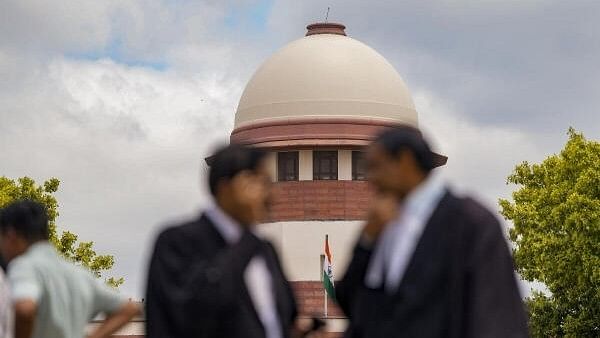
The Supreme Court of India.
Credit: PTI Photo
New Delhi: The Supreme Court on Tuesday ruled that the Bar Council of India and state bar councils cannot charge exorbitant and excessive for enrolment of advocates.
The court said the regulatory body cannot charge more than Rs 750 for advocates belonging to the general category and Rs 125 for advocates of SC/ST categories for their enrolment, contrary to what has been fixed by the Parliament as it created hurdles and acts as barrier into entering the legal profession.
A bench of Chief Justice of India D Y Chandrachud and Justices J B Pardiwala and Manoj Misra held the state bar councils cannot charge enrolment or miscellaneous fees above the amount prescribed.
"The right to pursue a profession is integral to the dignity of an individual. Charging exorbitant enrolment and miscellaneous fees as a precondition for enrolment creates a barrier to entry into the legal profession”, the bench said.
The judgment was pronounced on a batch of petitions filed by Gaurav Kumar and others challenging the exorbitant enrolment fees being charged by different state bar councils.
The court, however, clarified this judgment will have a prospective effect.
"The state bar councils are not required to refund the excess enrolment fee collected,” it said.
In the verdict, the court also made it clear that bar councils cannot charge enrolment fees beyond the express legal stipulation under Section 24(1)(f) of the Advocates Act.
“The state bar councils and the BCI cannot demand fees other than the stipulated enrolment fee…dignity is crucial to substantive equality. The dignity of the individual encompasses the right of the individual to develop their potential to the fullest," the bench said.
The bench pointed out that since the Parliament has specified the enrolment fee, the bar councils cannot violate it.
The court also said the BCI, the apex regulatory body for legal profession, and state bar councils can levy additional charges for the welfare and development work but cannot charge more than the fee stipulated under the Advocates Act.
The court also said that some state bar councils were charging as much as Rs 40,000 to enrol as an advocate, which would lead to denial of opportunity to those lawyers who belong to poor, backward and marginalised sections of the population.
